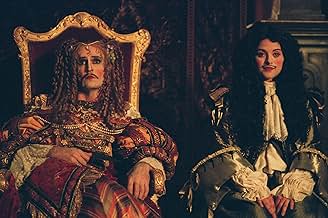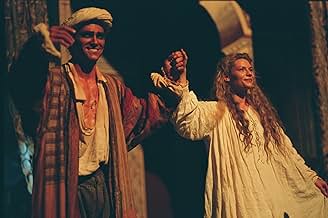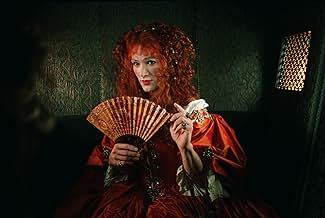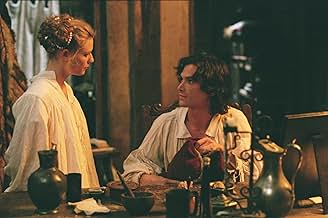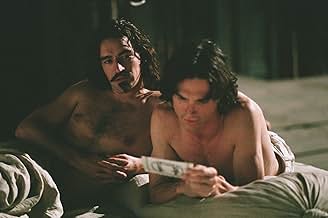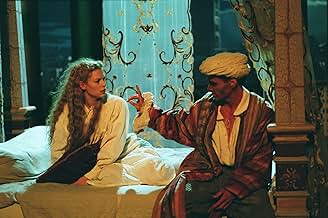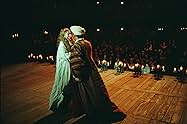Ajouter une intrigue dans votre langueA female theatre dresser creates a stir and sparks a revolution in seventeenth century London theatre by playing Desdemona in Othello. But what will become of the male actor she once worked ... Tout lireA female theatre dresser creates a stir and sparks a revolution in seventeenth century London theatre by playing Desdemona in Othello. But what will become of the male actor she once worked for and eventually replaced?A female theatre dresser creates a stir and sparks a revolution in seventeenth century London theatre by playing Desdemona in Othello. But what will become of the male actor she once worked for and eventually replaced?
- Réalisation
- Scénario
- Casting principal
- Récompenses
- 4 victoires et 1 nomination au total
Avis à la une
Ned Kynaston (Billy Crudup) is the greatest actor and the most beautiful "woman" of the English stage. He played several women's part and his most famous is the role of Desdemona in William Shakespeare's Othello. He is studied, admired, loved, and envied by his dress keeper, Maria (Claire Danes). She watches from the wings and longs to act and she does so behind Kynaston's back and in low pubs before a royal official, the Duke of Buckingham (Ben Chaplin). Then the chain of events unfold as Maria is introduced to Charles II (Rupert Everett) and his mistress Nell Gwyn (Zoe Tapper) who then declares that women will be given the freedom to perform in theater.
As Maria's fame rises and women are playing more and more of the female roles, Ned Kynaston (the last of his kind of actors) is casted aside. As an actor and as man, Kynaston had learned to suppress all masculinity in order to gain the grace and beauty of a woman. He knows only how to portray women and he is lost in learning to play male roles. But then again Maria is unable to play the role of Desdemona as a real woman. Both Kynaston and Maria fall in love and into passion as they learn from each other their own sexual identities and to channel their femininity and masculinity.
I fell in love with the film's story and with the performances of Billy Crudup and Claire Danes. As Kynaston, Crudup reveals vulnerability and strength as a man who discovers himself as a man (and a very hot one at that) through the role and eyes of being a woman. As Maria, Danes is beautiful and real: those tears are real! She can cry on cue and with the heartbreak of a real woman in love and envious of the man she loves. Maria is a strong, forthcoming, and in way a modern actress ahead of her time. She is not an "Eve" from All About Eve, she is a Viola Delesop from Shakespeare In Love, but real. The love scene between Danes and Crudup is sexy, tender, and passionate showing that explicit sex and nudity is not always necessary. They look into each other's sides and truly learn from each other as man and woman.
This is a highly recommended film for those who love acting, period pieces, or just if you want to see a really good film, "Stage Beauty" is very much the film to watch.
It tells the tale of Ned (Billy Crudup), a young actor who specialises in portraying women on stage. In a world where only men are allowed to tread the boards, Ned's "Desdemona" (from Shakespeare's Othello) is the closest thing 17th century audiences get to femininity in theatre. However, a young upstart in the form of Maria (played by Clare Danes) wants to change all that. She has a passion for drama and unfortunately the bisexual Ned. With the help of King Charles II (Rupert Everett), she may just get her wish, changing theatre forever, and hopefully pick up Ned on the way.
When thinking of the themes of the film, many people dismiss it as a clone of Shakespeare in Love. This is unfair- the film is more thought provoking, substantial and better acted than the aforementioned Oscar snaffler. It explores themes of sexuality and gender with insight and intelligence as well as telling (and, in fact enthralling us with) a love story. As previously referred to, the acting is exceptional, especially the two leads (Danes and Crudup) who shine. The supporting cast is strong too, with Richard Griffiths as a heterosexual prequel to his role in Withnail and I, Tom Wilkinson brimming with quiet intensity as Betterton and Everett hamming it up wonderfully as the King.
Even if it does end on a slightly trite note (not to give too much away, but its' "birth of method acting" shtick irritates), Stage Beauty is a funny, heart-warming and occasionally quite cerebral meditation on love and art. What more could any theatre, or film lover for that matter, want? And don't say Shakespeare In Love!
"Stage Beauty" is set in the world of seventeenth-century Restoration theatre, but the stage serves as a microcosm for life itself, and the roles played by the actors before the public mirror the roles they play in their private lives. The question is, do they create their roles, or do their roles create them?
Ned Kynaston (Billy Crudup) is an actor who takes on women's roles, since real women are not permitted to do so. He has been thoroughly trained and schooled in the then highly stylized technique of portraying women -- to such an extent that any trace of masculinity seems to have been drummed out of him.
His dresser Maria (Clare Danes) yearns to be an actress herself, but is prevented from doing so by the narrow conventions of Puritan England -- until Charles II is restored to the throne and decrees that, henceforth, real women shall play women's roles on the stage. A whole new world opens up for Maria, but it looks like curtains for Ned.
What happens next is pure anachronism: Ned and Maria are able to rise above the limitations and constraints of their era. Not only do they transcend their gender or sex roles, but they overcome their classical training and, in effect, engage in Method acting, a technique still three hundred years away in the far-distant future. When he teaches Maria how to break the mold and play Othello's Desdemona in a whole new, natural way, Ned becomes a seventeenth-century Stanislavsky.
But, by George, it works. Their performance of the celebrated death scene from "Othello" sends shock waves through an audience accustomed to pantomime and exaggerated gestures -- and it electrifies us as well.
Not since Joseph Fiennes and Gwyneth Paltrow in "Shakespeare in Love" have an actor and actress so shimmered and shone simultaneously on stage and screen. One hopes that Billy Crudup and Clare Danes will be remembered for their luminous performances at the 2005 Academy Awards.
I agree that Claire Danes acted well (though the hyperventilation happened once too often) and Billy Crudup brought a complexity to the role that I rarely see in films. The reference to Shakespeare in Love is an affectionate comparison: I enjoyed the light snack of Gwinny, luvvies and Fiennes and have sat through the DVD time and again. But that film had a predictability that Stage Beauty lacked. We didn't know that Stage Beauty's 'love element' would ever work out.
I do not see the development of the relationship between Danes and Crudup as a conversion from gay to straight. Instead I see a problematic progress from an imposed gender identity (perpetuated through sexual fantasy by Buckingham) to an un"knowing" but more satisfying state, where it's being yourself (whatever that is) not performing a role that counts. I think that this is relevant to all of us as we perform the roles that we and those who've influenced our upbringing have created for ourselves. We can't easily escape them (and some are more hammy than others in their performance) but the knowledge that life is performative and complex is, for me, liberating.
And all that from a costume drama!
Le saviez-vous
- AnecdotesClaire Danes and Billy Crudup became a couple after the filming of this movie. Crudup left his long-time girlfriend Mary-Louise Parker for Danes.
- GaffesNed Kynaston, age 20-something, says that he's been playing women on stage for half his life, since he was a child. But at the royal banquet, the King says that the theatres have only recently reopened after an 18-year shutdown caused by the Puritan takeover.
- Citations
King Charles II: Why shouldn't we have women on stage? After all, the French have been doing it for years.
Sir Edward Hyde: Whenever we're about to do something truly horrible, we always say that the French have been doing it for years.
Meilleurs choix
- How long is Stage Beauty?Alimenté par Alexa
Détails
- Date de sortie
- Pays d’origine
- Sites officiels
- Langue
- Aussi connu sous le nom de
- Compleat Female Stage Beauty
- Lieux de tournage
- Sociétés de production
- Voir plus de crédits d'entreprise sur IMDbPro
Box-office
- Montant brut aux États-Unis et au Canada
- 782 383 $US
- Week-end de sortie aux États-Unis et au Canada
- 38 654 $US
- 10 oct. 2004
- Montant brut mondial
- 2 307 092 $US
- Durée1 heure 46 minutes
- Mixage
- Rapport de forme
- 2.35 : 1
Contribuer à cette page




